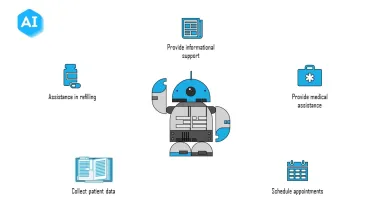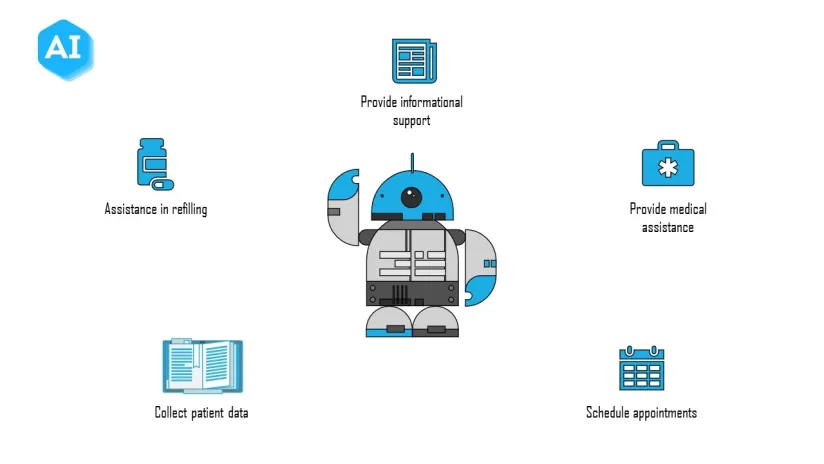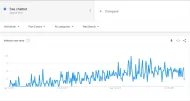Top 10 Chatbots in Healthcare: Insights & Use Cases in 2024


Today there is a chatbot solution for almost every industry, including marketing, real estate, finance, the government, B2B interactions, and healthcare. A recent survey shows that while 84% of those surveyed are inclined to spend more with brands that offer them the choice of their preferred communication channel; 74% of customers are likely to increase their spending with brands that provide options to resolve their queries without needing to interact with a live agent.1
Today, chatbots offer diagnosis of symptoms, mental healthcare consultation, nutrition facts and tracking, and more. For example, in 2020 WhatsApp collaborated with the World Health Organization (WHO) to make a chatbot service that answers users’ questions on COVID-19.
In this article, we explain why chatbots are important in healthcare, go through six of their use cases, and look into what the future holds for healthcare chatbots.
Top 10 chatbots in healthcare
| Vendor | Functionality & Purpose | Employee Size | Free Plan / Trial | Pricing | Additional Features |
|---|---|---|---|---|---|
| Zoho SalesIQ | Mediator-Consultance | 10K+ | ✅ | Basic: €10* (p/mo) Professional: €17 (p/mo) Enterprise: €17 (p/mo) | -Conversation with patients -Appointment booking |
| Ada Health | Broad Medical Advice & Symptom Analysis | 201-500 | ✅ | N/A | -6+ health categories -7+ languages -Health articles -BMI calculator |
| Florence | Medical Advice & Tracking | 201-500 | Demo | N/A | -Reminders -Finds location of doctor & pharmacy |
| Buoy Health | Broad Medical Advice & Symptom Analysis | 51-200 | ✅ | N/A | -Expert guided plans -16+ symptoms |
| Gyant | Symptom Analysis & Triage | 51-200 | N/A | N/A | Native support for both clinical and non-clinical patient requests. |
| Keenethics’ OneRemission | Health Tracking for Cancer Patients | 51-200 | N/A | N/A | -Sleep and stress management practices -24/7 online oncologist |
| Woebot | Mental Health Management & CBT** | 51-200 | Offered only by access code | N/A | Guidance in 3 different therapy approaches |
| Sensely’s Molly | Virtual Nurse & Medical Advice & Symptom Analysis | 11-50 | Demo | N/A | -Uses triage system to detect emergency -9+ app integration -Serves
with different personas -8+ languages
|
| Youper | Mental Health Management & Therapy Exercises | 11-50 | 7-day | Premium: $69.99 annually | -Personalized meditations -Symptom monitoring & analysis |
| Babylon Health | Broad Medical Advice | 2-10 | ✅ | Pay As You Go £48 Advanced Nurse Practitioner £48 Physiotherapist
£45 Mental Health Practitioner £45 Pharmacist
| -Referrals, sick notes, prescriptions -24/7 online clinician |
Table features:
Chatbots are sorted by employee size.
*For more information on ZohoSalesIQ pricing, check: “Top 30+ Conversational AI Platforms of 2023: Detailed Guide”
**Cognitive Behavioural Therapy
Why are chatbots important in healthcare?
According to research, the most valuable features of using chatbots in healthcare include:2
- Monitoring: Awareness and tracking of user’s behavior, anxiety, and weight changes to encourage developing better habits.
- Anonymity: Especially in sensitive and mental health issues.
- Personalization: Level of personalization depends on the specific application. Some applications make use of measurements of:
- Physical vitals (oxygenation, heart rhythm, body temperature) via mobile sensors.
- Patient behavior via facial recognition.
- Real time interaction: Immediate response, notifications, and reminders.
- Scalability: Ability to react with numerous users at the same time.
What are the top chatbot use cases in healthcare?
Chatbot use cases in healthcare include:
1. Provide medical information
Chatbot algorithms are trained on massive healthcare data, including disease symptoms, diagnostics, markers, and available treatments. Public datasets are used to continuously train chatbots, such as COVIDx for COVID-19 diagnosis, and Wisconsin Breast Cancer Diagnosis (WBCD).
Conversational chatbots with different intelligence levels can understand the questions of the user and provide answers based on pre-defined labels in the training data.
2. Schedule medical appointments
Chatbots are integrated into the medical facility database to extract information about suitable physicians, available slots, clinics, and pharmacies working days.
Chatbots ask patients about their current health issue, find matching physicians and dentists, provide available time slots, and can schedule, reschedule, and delete appointments for patients. Chatbots can also be integrated into user’s device calendars to send reminders and updates about medical appointments.
3. Collect patient data
Chatbots can extract patient information by asking simple questions such as their name, address, symptoms, current doctor, and insurance details. The chatbots then, through EDI, store this information in the medical facility database to facilitate patient admission, symptom tracking, doctor-patient communication, and medical record keeping.
4. Handle insurance inquiries
Chatbots can provide insurance services and healthcare resources to patients and insurance plan members. Moreover, integrating RPA or other automation solutions with chatbots allows for automating insurance claims processing and healthcare billing. You can check our article on intelligent automation in healthcare.
5. Provide mental health assistance
Chatbots that provide mental health assistance are trained to deliver cognitive behavioral therapy (CBT) for patients with depression, post-traumatic stress disorder (PTSD), and anxiety, or train autistic patients to improve their social skills and job interview skills. Users can interact with chatbots via text, microphones, and cameras.
6. Request prescription refills
Chatbots collect patient information, name, birthday, contact information, current doctor, last visit to the clinic, and prescription information. The chatbot submits a request to the patient’s doctor for a final decision and contacts the patient when a refill is available and due.
This allows doctors to process prescription refills in batch or automate them in cases where doctor intervention is not necessary.
What does the healthcare chatbots market and future look like?
We’ve explored before in our article on chatbot statistics and market size that:
- healthcare is among the top 5 industries that benefit from chatbot
- chatbots are expected to make up a market size of more than $1 billion.
On the other hand, the global COVID-19 pandemic has driven a need for chatbots to provide healthcare assistance without risking healthcare workers:
- Direct patients with severe symptoms to healthcare facilities with available acute-care beds.
- Provide around-the-clock information about COVID-19 updates and symptoms, and answer FAQs.
- Provide mental health assistance to cope with pandemic stress.
This global experience will impact the healthcare industry’s dependence on chatbots, and might provide broad and new chatbot implementation opportunities in the future.
For more on chatbots
If you are interested in knowing how chatbots work, read our articles on voice recognition applications and natural language processing.
You might also find these articles about chatbot use cases interesting:
- Top 7 Conversational AI Platforms of 2023: Detailed Guide
- Conversational Commerce: Benefits, Best Practices & Examples.
- Retail Chatbots: Top 12 Use Cases & Examples.
- The Ultimate Guide To Emotional Chatbots.
When you are ready to invest in conversational AI, you can identify the top vendors using our data-rich vendor list on voice AI or chatbot platforms.
If you have questions about how chatbots can help your business, we can help:
External Links
- 1. “What Do Consumers Really Think of Automated Customer Service?” AWS. Retrieved on November 23, 2023.
- 2. “Using Health Chatbots for Behavior Change: A Mapping Study” Springer Link. Retrieved on November 23, 2023.

Cem has been the principal analyst at AIMultiple since 2017. AIMultiple informs hundreds of thousands of businesses (as per similarWeb) including 60% of Fortune 500 every month.
Cem's work has been cited by leading global publications including Business Insider, Forbes, Washington Post, global firms like Deloitte, HPE, NGOs like World Economic Forum and supranational organizations like European Commission. You can see more reputable companies and media that referenced AIMultiple.
Throughout his career, Cem served as a tech consultant, tech buyer and tech entrepreneur. He advised businesses on their enterprise software, automation, cloud, AI / ML and other technology related decisions at McKinsey & Company and Altman Solon for more than a decade. He also published a McKinsey report on digitalization.
He led technology strategy and procurement of a telco while reporting to the CEO. He has also led commercial growth of deep tech company Hypatos that reached a 7 digit annual recurring revenue and a 9 digit valuation from 0 within 2 years. Cem's work in Hypatos was covered by leading technology publications like TechCrunch and Business Insider.
Cem regularly speaks at international technology conferences. He graduated from Bogazici University as a computer engineer and holds an MBA from Columbia Business School.
To stay up-to-date on B2B tech & accelerate your enterprise:
Follow onNext to Read
Chatbot vs Voicebot: Where to Use Each One in 2024?
Mortgage Chatbots in 2024: Top Use Cases & Examples
Top 9 Real Estate Chatbot Use Cases & Best Practices in 2024
Great list of vendors, really enjoyed reading this piece. I would also add Hyro.ai to the list.
Thanks for the comment. You can sign up your company and products via https://grow.aimultiple.com


Comments
Your email address will not be published. All fields are required.